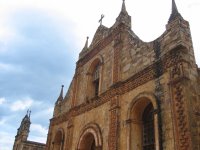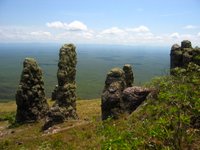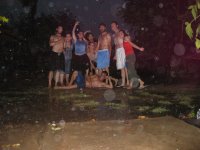


Faltar is my new word, by virtue of its use to answer every other question I´ve asked recently (not quite as much as the use of pues though). It means to be lacking, as in:
Me: “Why is there a blockade today/do you serve rice and two types of potatoes in one meal/is that child pooping on the sidewalk?”
Bolivian: “Por falta de plata/educación/[insert any other element of infrastructure here], you jerk.*”
(* Bolivian does not actually say “you jerk”, but that is the feeling I get)
I use it more to tell how adjusted I’m feeling, since at any given moment I might be feeling falta my family or friends at home, pad kee mao (with tofu, spiciness level 7 on a scale of 1-10), water pressure, privacy, red velvet cake, etc. But it’s more a factual lacking than a terrible missing, so as B43 hits month 2 I think I’m settled in. I have stopped feeling a little sick after every meal and can brush my teeth without filtered water. Trips to the hospital are no longer a shock now that more than half the group has had amoebas or bacteria or giardia. We’ve also passed the milestones of getting out of robbery set-ups and the first resignation from our group last month.
Training winds down with a technical week running a business simulation, this year in the department of Santa Cruz. It was the first of the media luna, the half moon of departments that passed referendum on the Autonomia movement for political decentralization last summer. To get to Santa Cruz we drive through the Chapare, the dominating province of the department of Cochabamba. It is lush mountain valleys of green, wrapped in cloud and that great simultaneous smell/feel/sound of damp, breathing jungle. In the 80s cholitas would sell cocaine in piles by the roadside. Today, anti-U.S. hostility over coca eradication and DEA activity mean Peace Corps volunteers aren’t even allowed to travel here.
Santa Cruz city feels like another country. It is tropical, modern, sprawling. We arrive at 1 a.m. and I am hotter than I have been my entire time in Bolivia. The hostel shower shoots one stream of water at the ceiling, the other at the towel rack, and delivers a mild electric shock if you try to adjust the showerhead. Luckily, we leave the next morning for San Jose de Chiquitos, a small town on the Jesuit Mission circuit, via a hellish 10-hour rocky dirt road. It is so hot in Santa Cruz I take cold showers for sanity. On the bright side, cold showers give me the best water pressure I’ve had in Bolivia, since in our host community every shower in town (all three of them) gets hotter the lower you turn the water on.
Within Bolivia there is regional rivalry between the Cambas of the tropics and the Collas of the highlands. I’ve decided the Collas have got it on climate and this heat-humidity just destroyed my life goal of living in a rainforest. We ooze through the week teaching classes and understanding why nothing moves between the hours of noon and 4 except the hammocks strung up in every open shaded space.
If I had a project that could afford me lying in a tub of ice for 6 hours during the middle of the day, I would love to live in Santa Cruz. The humidity (or heat delirium) intensifies every color, there is constantly the sound of living things, and the weather is wild. Heat gives way to freezing surazo winds that roll in unchecked by the flatness of the Chaco to the south, or the humidity topples over into explosive tropical storms. It’s almost neat enough to make you overlook being hit in the head by careening, giant horned beetles every night.
FUN FACT/QUOTE OF THE DAY: In Bolivia, it’s good luck to pinch black people.
Me: “Why is there a blockade today/do you serve rice and two types of potatoes in one meal/is that child pooping on the sidewalk?”
Bolivian: “Por falta de plata/educación/[insert any other element of infrastructure here], you jerk.*”
(* Bolivian does not actually say “you jerk”, but that is the feeling I get)
I use it more to tell how adjusted I’m feeling, since at any given moment I might be feeling falta my family or friends at home, pad kee mao (with tofu, spiciness level 7 on a scale of 1-10), water pressure, privacy, red velvet cake, etc. But it’s more a factual lacking than a terrible missing, so as B43 hits month 2 I think I’m settled in. I have stopped feeling a little sick after every meal and can brush my teeth without filtered water. Trips to the hospital are no longer a shock now that more than half the group has had amoebas or bacteria or giardia. We’ve also passed the milestones of getting out of robbery set-ups and the first resignation from our group last month.
Training winds down with a technical week running a business simulation, this year in the department of Santa Cruz. It was the first of the media luna, the half moon of departments that passed referendum on the Autonomia movement for political decentralization last summer. To get to Santa Cruz we drive through the Chapare, the dominating province of the department of Cochabamba. It is lush mountain valleys of green, wrapped in cloud and that great simultaneous smell/feel/sound of damp, breathing jungle. In the 80s cholitas would sell cocaine in piles by the roadside. Today, anti-U.S. hostility over coca eradication and DEA activity mean Peace Corps volunteers aren’t even allowed to travel here.
Santa Cruz city feels like another country. It is tropical, modern, sprawling. We arrive at 1 a.m. and I am hotter than I have been my entire time in Bolivia. The hostel shower shoots one stream of water at the ceiling, the other at the towel rack, and delivers a mild electric shock if you try to adjust the showerhead. Luckily, we leave the next morning for San Jose de Chiquitos, a small town on the Jesuit Mission circuit, via a hellish 10-hour rocky dirt road. It is so hot in Santa Cruz I take cold showers for sanity. On the bright side, cold showers give me the best water pressure I’ve had in Bolivia, since in our host community every shower in town (all three of them) gets hotter the lower you turn the water on.
Within Bolivia there is regional rivalry between the Cambas of the tropics and the Collas of the highlands. I’ve decided the Collas have got it on climate and this heat-humidity just destroyed my life goal of living in a rainforest. We ooze through the week teaching classes and understanding why nothing moves between the hours of noon and 4 except the hammocks strung up in every open shaded space.
If I had a project that could afford me lying in a tub of ice for 6 hours during the middle of the day, I would love to live in Santa Cruz. The humidity (or heat delirium) intensifies every color, there is constantly the sound of living things, and the weather is wild. Heat gives way to freezing surazo winds that roll in unchecked by the flatness of the Chaco to the south, or the humidity topples over into explosive tropical storms. It’s almost neat enough to make you overlook being hit in the head by careening, giant horned beetles every night.
FUN FACT/QUOTE OF THE DAY: In Bolivia, it’s good luck to pinch black people.



